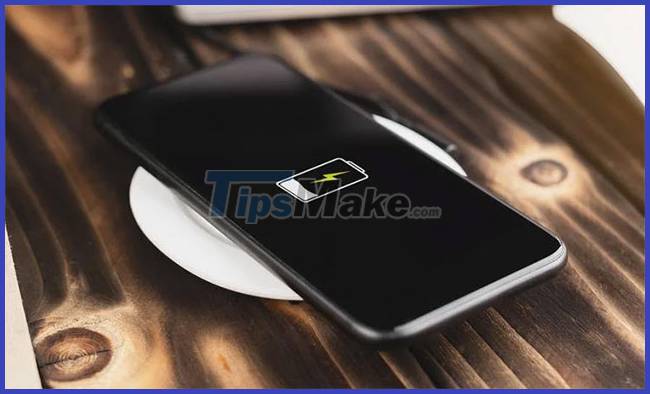Is wireless charging bad for the battery?
The way this technology works is also not complicated. Simply place the device on a dedicated charging pad and watch the battery fill up like magic.
The convenience that wireless charging brings is undisputed. However, there are also concerns that this technology will harm the device's battery? And is that worry justified? Find out below.
How does wireless charging work?
To understand where people's interest in wireless charging comes from, we first need to talk about how this technology works.
When you charge your phone in the traditional way, for example with a USB cable, low voltage current is transferred from the charger to the phone through the wire. And when you charge your phone with the wireless charging pad, it basically still has the charger and the lead. But this lead will connect to the charging pad, not directly into the phone. When the pad is activated by the presence of a compatible device (your phone is on it), a magnetic coil inside the pad begins to emit a low-energy magnetic field. This field interacts with an analog coil underneath the phone's back, and this coil converts the magnetic energy generated by the charging dock's coil into electricity to charge the phone's battery.
Wireless charging has been on the market for many years now. The technology was actually invented in 2008, but hasn't appeared on commercial products for many years. The first phone model to support wireless charging was the Nokia 920 Windows Phone, which was released in 2012. That same year, the Samsung Galaxy S3 supported wireless charging (but you'll need the adapter as an accessory). The first Galaxy to support true wireless charging was the Galaxy S6 in 2015. Apple added wireless charging to the first iPhone line on the iPhone 8 and iPhone X in 2017.

Will wireless charging damage the device battery?
Where do concerns about wireless charging and battery life come from? Wireless charging is not 100% efficient, and some of the energy used to activate the base coil and coil in the phone is lost to the environment as heat energy.
You will also feel the difference in temperature at the back of the device when charging normally and wirelessly. Charging with a typical 5W (or lower) charger will barely heat up your phone, and it can be difficult to detect a difference depending on the ambient temperature in the room.
Charging with a wireless charger will usually generate enough heat that you might notice some warmth when you remove your phone from the charger. And fast chargers will usually generate enough heat to make you feel uncomfortable holding the device.
According to the manufacturers, the above experiences are completely normal and within the expected operating parameters of the phone. In its wireless charging document, Apple notes that users may feel a warm feeling on the iPhone, and if it gets too hot, the device will automatically limit the charging process. Samsung's documentation repeats the same thing: if your Galaxy phone gets unusually hot while charging, charging will stop.
Many people believe that the high heat when charging wirelessly can affect the battery life of the device. However, aside from arguing over the minutiae technical details, in the real world there isn't much evidence for this damage. There are so many other variables at play, such as how often you use up and recharge the battery, operating environment, etc., so it is difficult to isolate wireless charging as the only factor in degradation. battery life.
For example, phone manufacturers will tell you that exposure to temperatures above 95 degrees F (35 degrees C) can permanently degrade the health of your phone's battery. However, millions of people always use their phones in environments where the temperature is close to or above 95 degrees Fahrenheit. Just walking around on a sunny summer day with the phone in your pocket, the temperature is sure to be high. more than that. Or charging your phone indoors on a hot day without air conditioning will easily cause the device's temperature to exceed that threshold.
Overall, the fact that your phone does get a little warm when wirelessly charging is hardly harmful compared to the other external factors it is exposed to every day.
Should you stop wirelessly charging your phone?
Maybe you're considering switching from wireless charging to just slow charging your phone using a wired charger. If you do that, you could theoretically keep your battery health a few percent higher, but at the expense of the inconvenience, which in many cases takes more time than wireless charging.
The idea that you can keep your phone battery in perfect condition forever is a myth. The battery in your phone can drain over time, just like car tires. You won't be able to leave your car in the gas station day after day to avoid a tire change, and you shouldn't be too petty about your phone just to avoid having to change the battery.
In fact, you'll likely have your phone replaced before the battery degrades significantly. In addition, replacing the current phone battery is not difficult or too expensive. You shouldn't worry about your phone battery, but better just enjoy the convenience of modern technology.
You should read it
- ★ The day of true wireless charging is coming
- ★ Top 16 best backup chargers 2019
- ★ Instructions for making backup batteries from an orange, charging nearly 40% of the battery for iPhone
- ★ Samsung launches two new backup batteries and car chargers, supporting 'superfast' quick charging
- ★ Causes and ways to fix the charger is hot when charging